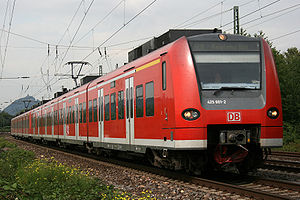DBAG Class 425
DBAG Class 425 (and 435) / 426
 |
| Type and origin |
| Power type |
Electric |
| Builder |
Bombardier, Siemens and DWA (consortium) |
| Build date |
1999-2008 |
| Total produced |
249 / 43 |
|
|
|
| Performance figures |
| Maximum speed |
140 km/h (87 mph) |
| Power output |
425: 2,350 kW (3,150 hp) / 426: 1,175 kW (1,576 hp) |
| Tractive effort |
BR 425: 140 kN / BR 426: 70 kN |
|
| Career |
| Nicknames |
"Quietschie" |
| Locale |
Germany |
|
| Type and origin |
| Power type |
Electric |
| Builder |
Bombardier, Siemens and DWA (consortium) |
| Build date |
1999-2008 |
| Total produced |
249 / 43 |
| Performance figures |
| Maximum speed |
140 km/h (87 mph) |
| Power output |
425: 2,350 kW (3,150 hp) / 426: 1,175 kW (1,576 hp) |
| Tractive effort |
BR 425: 140 kN / BR 426: 70 kN |
| Career |
| Nicknames |
"Quietschie" |
| Locale |
Germany |
The Classes 425 and 426 EMUs are a class of electric multiple units built by a consortium of Siemens, Bombardier and DWA and operated by DB Regio in Germany. They are essentially the same vehicle, but the class 425 EMU consists of four segments, while the class 426 EMUs only have two parts.
It is a high-powered, light-weight vehicle with high acceleration for short- and medium-distance services with frequent stops. The aluminium superstructure was built as flat as possible, both to minimize drag and to ease automated cleaning. The acceleration is achieved by distributing traction motors among eight of the train's ten axles including two of the three jacobs bogies.
It is based on the Class 423 design, but lacks a third set of doorways in the centre of each car.
...
Wikipedia

